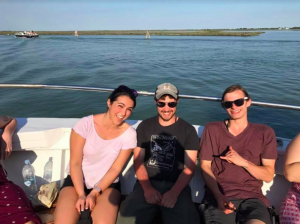By David Tschirch, Contributing Writer

Kristen Manzo, David Tschirch and Don Hutchins enjoy a trip through the Venice lagoon. (Photo Courtesy of Luann Yetter)
Many people who hear the words “May Term to Italy” may quickly imagine themselves meandering through museums, eating stupendous amounts of pizza and pasta, and drinking wine with friends. While I did find myself doing many of these things when participating in the UMF travel course to Italy this past May, I know now that there is much more to gain during an experience abroad.
Prior to traveling to Italy, I thought I had wined and dined, but I can now say with certainty that I was very wrong. In Italy, eating dinner is a way of life, a religion, and more importantly an experience. Your waiter or waitress will seat you. They do not pester you with questions; they let you take your time: they come over to your table when you nod to them. Even ordering a bottle of wine is an experience in itself. It comes to your table. The waiter pours one person just a taste of wine. He waits for you to take a sip just because he wants to be certain you are thoroughly enjoying it.
Italians look at food as a passion; they handle it with care and respect. I ate the best piece of chicken I have ever sunk my teeth into at a restaurant called Palantino in Florence. A few of my friends can attest that I nearly cried and laughed with joy after taking one bite. I never would have thought that something as simple as a piece of chicken could taste that amazing. You take your time with a meal which usually takes place much later in the evening. To my surprise the meals were reasonably priced: 12.50 euros for the roasted chicken and potatoes. Also, get the house wine. Usually a bottle is no more than 12 euros.
But enough about food.
What truly captured my attention throughout my stay was the famous artwork found within the country. The most notable fact that made Italy’s art so impressive to me (and I’m sure fellow Americans as well) is how old much of the artwork is. Some of the artwork is over five thousand years old, and it’s beauty is undeniable. On this trip, you will have opportunities to see the seventeen foot tall statue of David, the Duomo, the interior of the Duomo, (which has a mural of Dante’s depiction of hell),and many ancient churches such as San Marco in Venice as well. These churches have some of the most pristine art work you will ever see, and many of them have beautiful murals on the ceilings with interpretations of biblical stories. You will see the Coliseum, the Vatican with the museum and all the diverse art it has to offer, the Sistine Chapel, and so much more.
Though I know I’m convincing you to jump on board for the next Italy trip, you may still be asking yourself how a study abroad trip to Italy will benefit yout education. Well, have you ever heard the term Renaissance Man? A Renaissance Man by definition is a person whose expertise spans a significant number of subject areas; such a person is known to draw on complex bodies of knowledge to solve specific problems. These people are well rounded individuals, and I am certain that there is only so much you can learn if you never get out of your comfort zone.
I have spent three full years at UMF. Some of that time has been the greatest of my life, but those fifteen days in Italy are days I will never forget. And I believe that many students on that trip would agree.
UMF student Donald Hutchins was one of my fellow travelers and also feels that May Term was special. “There is only so much that can be effectively taught in a classroom or by institutional guidelines,” he said. “Getting into the world and engaging places and events you’ve read about or researched not only provides a basis for increased academic knowledge, but also the practical wisdom and intelligence necessary for experiencing the best that life has to offer. Studying abroad fills the gaps where traditional and liberal arts academia falls short, and puts the student at the wheel of their experience in the face of unprecedented potential opportunities – for study and leisure.”
If you take only one point from this article, it should be is this: get out of your comfort zone and apply something you have learned in a classroom to real life. I can assure you that traveling to Italy will leave you more confident than ever; you will know what good food tastes like; you will meet some of the happiest people in the world, like a woman you buy a cappuccino from every morning who remembers your face, or the owners of the hotel who greet you every day with a wholesome smile. You will see some of the most impressive art the world has to offer. You may even say “Grazie” instead of thank you when you come back home. And maybe, just maybe, you will become a Renaissance Man.